Pam Lecky's Blog, page 10
March 29, 2023
Godwine Kingmaker by Mercedes Rochelle: The Coffee Pot Book Blog Tour
Today, I am delighted to host Mercedes Rochelle on her tour for Godwine Kingmaker, part of the Last Great Saxon Earls series. Mercedes has kindly contributed an article on Tostig and Harold (see below).
You can follow the complete tour here: https://thecoffeepotbookclub.blogspot.com/2023/01/blog-tour-last-great-saxon-earls.html
GODWINE KINGMAKER by Mercedes RochelleThey showed so much promise. What happened to the Godwines? How did they lose their grip? Who was this Godwine anyway, first Earl of Wessex and known as the Kingmaker? Was he an unscrupulous schemer, using King and Witan to gain power? Or was he the greatest of all Saxon Earls, protector of the English against the hated Normans? The answer depends on who you ask.
He was befriended by the Danes, raised up by Canute the Great, given an Earldom and a wife from the highest Danish ranks. He sired nine children, among them four Earls, a Queen and a future King. Along with his power came a struggle to keep his enemies at bay, and Godwine’s best efforts were brought down by the misdeeds of his eldest son Swegn.
Although he became father-in-law to a reluctant Edward the Confessor, his fortunes dwindled as the Normans gained prominence at court. Driven into exile, Godwine regathered his forces and came back even stronger, only to discover that his second son Harold was destined to surpass him in renown and glory.

Buy Links:
This series is available on Kindle Unlimited
Universal Link: https://books2read.com/u/38VrJZ
Audio: https://www.audible.com/pd/Godwine-Kingmaker-Audiobook/B09JFJCY3G
TOSTIG AND HAROLD’S SIBLING RIVALRY
by Mercedes Rochelle
To this day, more than 950 years after the Norman Conquest, many of us are still fascinated by the causes of this pivotal event—and I am one of them. If Harold Godwineson hadn’t been 260 miles away fighting his brother when Duke William landed at Pevensey, things might have gone differently. So where does Tostig come into this? From outlawry to Stamford Bridge, Tostig was on the wrong side of the law. In his last battle, he seems to have been second in command after Harald Hardrada and has been branded as a traitor ever since.
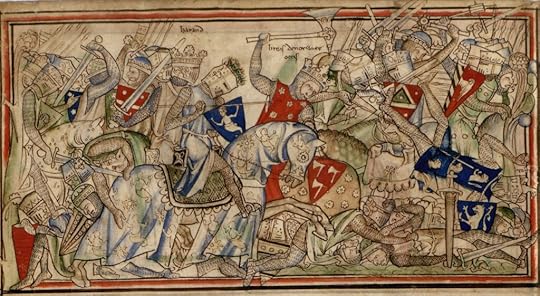
Battle of Stamford Bridge: Cambridge University Library MS. Ee.iii.59
It was thought by many that Tostig himself persuaded Hardrada to invade, thus forcing King Harold to rush north and defend his kingdom against the Vikings. However, this conclusion is by no means certain; nobody was tracing Tostig’s movements in the early part of 1066. It’s entirely possible that the Norwegian King planned the invasion on his own, and Tostig merely fell in with his army when the time came. There is no doubt that Hardrada was the leader of the Viking invasion. What exactly Tostig thought to accomplish is uncertain. Perhaps he only wanted his old earldom back. Or, he might have bargained to rule his old earldom as sub-king to Harald. Maybe he hoped Hardrada would get killed and he could rule in his stead, unlikely though that sounds.
But why was Tostig fighting against his brother, anyway? This was the question that inspired me to write THE SONS OF GODWINE and FATAL RIVALRY. Why was he outlawed? How could Harold allow his brother to go off in such a rage that he would come back with an invading army? Surely Tostig had his reasons; such a devastating turn of events could have not come about arbitrarily.
In a situation like this, matters usually deteriorate over the course of time. Harold and Tostig were only a couple of years apart. Was there rivalry from their boyhood? Did Tostig feel left out? When Tostig became Earl of Northumbria, his brother had already been Earl (first of East Anglia and then of Wessex) for 10 years. What did Tostig do all that time? There was no catching up; by 1055 Harold was practically the “right hand” of King Edward, and frequently took on responsibilities that the king didn’t want to be bothered with. When Tostig helped his brother during the Welsh campaign of 1063, what was his reward? Harold was lauded as a great warrior because of this campaign; Tostig barely received mention, and may well have emptied his coffers to help pay for it. Could this have contributed to the stress between them?
The real trouble started in 1065; up until then Tostig had ruled Northumbria for 10 years without any major disturbance. However, after the Welsh campaign he found himself obliged to impose new taxes on this previously undertaxed earldom. Some have said that Tostig needed to pay for the campaign. Other historians suggested he was urged to do so by Harold, acting in concert with the king who wanted to bring the north more in line with his southern provinces. There were some political assassinations that might have contributed to the unrest, but most historians agree that taxation issues pushed the troublesome thegns to revolt.
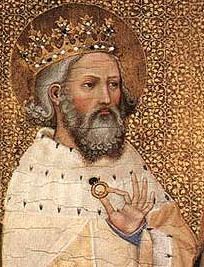
King Edward the Confessor, detail from the Wilton Diptych – Wikipedia
And what a revolt it was! Tostig was in the south hunting with King Edward when thegns from all over Yorkshire and Northumberland gathered in York and attacked the Earl’s housecarls, catching them totally unprepared. Although Tostig’s 200+ troops tried to fight back, they were unable to mount an organized defense and were killed almost to a man. The rampaging rebels broke into the armory, destroyed Tostig’s manors, and raided the treasury, making off with all the carefully gathered taxes.
Next on the agenda was to call a witan and elect a new Earl: Morcar, younger son of Earl Aelfgar of Mercia—who just happened to be standing by. This was a totally illegal move and the rebels knew it, so they proceeded to rampage their way south and force the issue with the king. Enter Harold, who was delegated to mediate for Tostig. King Edward and Tostig had every reason to believe Harold would get what they wanted, so they were more than horrified when their negotiator came back with rebels in tow. Morcar and his supporters didn’t trust Harold and insisted that the king be confronted personally with all their demands. A second round of negotiations ensued, and Harold was still unable to budge the rampaging Northumbrians. They declared that Tostig had to go and that Morcar be officially declared Earl, or else they would continue their depredations into East Anglia.
Tostig went into a rage and accused Harold of fomenting the rebellion himself. In self-defense, Harold offered his sworn oath that he was not responsible but Tostig was having none of it. Edward wanted to raise the fyrd and teach his errant subjects a lesson, but the late season and poor support for Tostig’s cause were enough to foil the king’s empty threats. Edward eventually backed down and gave into the rebel demands, though the loss of royal prestige was a blow the king never recovered from. Just over a month later, King Edward was dead.
Tostig left the country voluntarily enough, loaded with gifts from the king but still swearing revenge against his brother. Apparently Harold washed his hands of the whole situation, for he is not recorded attempting to offer Tostig any compensation until the battle of Stamford Bridge. Even after he became king, Harold supported the wily sons of Aelfgar (his former rivals) and even married their sister to prove that Tostig was not coming back. Tostig may have found this doubly insulting. By the time they faced each other on the battlefield, Harold is said to have offered back the earldom if Tostig would lay down his arms. When Tostig asked what Harold was prepared to offer Hardrada, we hear the famous line “Seven feet of English ground, or as much more as he may be taller than other men.” At this response, Tostig righteously refused his brother’s offer. (I still find this episode a little implausible; it came from Snorri Sturluson, whose account may be somewhat apocryphal.)
So his sense of betrayal was surely a driving force for Tostig’s attempted return. But there is another factor to remember: there were plenty of precedents for an Earl to rampage his way back into favor. Earl Godwine did it in 1052, and Harold himself was part of that reunion; his bloody encounter at Porlock left behind 30 dead thegns and countless others. Even Aelfgar, Morcar’s father, wreaked havoc on two occasions (the first causing the destruction of Hereford in 1055); both times he was restored to his earldom. So Tostig was just following suit; of course, his allies were a bit more powerful than Aelfgar’s!
Author Bio:
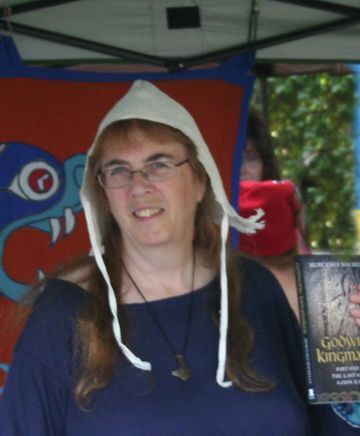
Mercedes Rochelle is an ardent lover of medieval history, and has channeled this interest into fiction writing. She believes that good Historical Fiction, or Faction as it’s coming to be known, is an excellent way to introduce the subject to curious readers. She also writes a blog: HistoricalBritainBlog.com to explore the history behind the story.
Born in St. Louis, MO, she received by BA in Literature at the Univ. of Missouri St.Louis in 1979 then moved to New York in 1982 while in her mid-20s to “see the world”. The search hasn’t ended!
Today she lives in Sergeantsville, NJ with her husband in a log home they had built themselves.
Social Media Links:
Website: https://mercedesrochelle.com/
Twitter: https://twitter.com/authorrochelle
Facebook: https://www.facebook.com/mercedesrochelle.net
Book Bub: https://www.bookbub.com/authors/mercedes-rochelle
Amazon Author Page: https://www.amazon.com/stores/Mercedes-Rochelle/author/B001KMG5P6
Goodreads: https://www.goodreads.com/author/show/1696491.Mercedes_Rochelle
March 17, 2023
Run with the Hare, Hunt with the Hound: The Coffee Pot Book Blog Tour
Today, I am delighted to host Paul M. Duffy for the book blog tour for Run with the Hare, Hunt with the Hound. Paul has kindly provided an excerpt to whet your appetite – please see below.
You can follow the full tour here: https://thecoffeepotbookclub.blogspot.com/2023/02/blog-tour-run-with-hare-hunt-with-hound.html
Run with the Hare, Hunt with the Hound by Paul M. DuffyOn a remote Gaelic farmstead in medieval Ireland, word reaches Alberic of conquering Norman knights arriving from England. Oppressed by the social order that enslaved his Norman father, he yearns for the reckoning he believes the invaders will bring—but his world is about to burn. Captured by the Norman knight Hugo de Lacy and installed at Dublin Castle as a translator, Alberic’s confused loyalties are tested at every turn. When de Lacy marches inland, Alberic is set on a collision course with his former masters amidst rumours of a great Gaelic army rising in the west. Can Alberic navigate safely through revenge, lust and betrayal to find his place amidst the birth of a kingdom in a land of war?
Buy Link:
Universal Link: https://books2read.com/u/4j5pdl
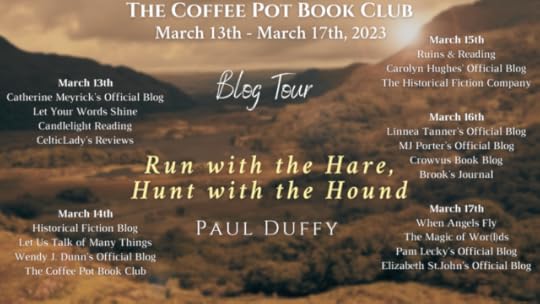 An Excerpt from Run with the Hare, Hunt with the House
An Excerpt from Run with the Hare, Hunt with the HouseFile
We saw signs of the fall. Of the havoc wrought far from our lands by the Engleis. Dishevelled bands of exiles travelling north on the slíghe. Fires beyond our borders and reports of silhouetted horsemen furtive on the hills. The Tiarna kept vigil, the kelt ever in his fist. Then the poet came and his approach heralded destruction. That itinerant wizard. That unholy satirist. He signalled the reckoning, whether he knew it or not. He signalled the intrusion of the outside world. The small fruit of my existence bursting open, its rind splitting and wasps spilling from galls to crowd the opening and feed on the juice.
Lochru saw him first, late that next day. He came to fetch me from the monastery and bring me back to the Tiarna’s farmstead, the lad Fiachra with him leading a donkey, his eyes full of suspicion. On our return past the low meadow, we stopped to try our hand with the winter geese and saw the poet wandering at the edge of the bog that ran away eastwards from our borders.
‘There’s a crane yonder in the meadowland,’ Lochru said in that archaic way he had of speaking, his dropsied face muffling his words and his snout pointing over the sedge. We lay on our bellies behind a crisping brace of fern. On the flat before us, a riot of geese clamoured and fouled the ground with their black excrement. Slings in our fists, we lay still, watching the birds rooting at the damp earth for whatever it is that gives them sustenance.
‘Crane?’ I whispered and Lochru snorted, letting me know that my youth had betrayed me. That there was no crane. That there was something strange somewhere. Something out of place in the sloping scene before us. I said no more, but studied the foreground where the great tumult of geese jostled. My eyes ranged further, beyond the limits of the river, marked by a line of bulrush rising from the grass. And beyond that, a glistening wet ground, full of the swollen river overspill with willow and elder un-coppiced and growing wild. I saw nothing to remark upon. Lochru waited still, his satisfaction that his old eyes had seen what I could not, competing with his mounting impatience.
Then I saw him, stooping as he moved slowly around the tree roots, navigating the edge of the wide bog. His head covered with a bolt of cloth which fell around his shoulders and beneath, a green cloak skirting his knees. The colour of his cloak announced him as a man of status. A man that should be on the slíghe with a retinue and a horse, not travelling alone, slopping through the turf.
‘Exile?’ I whispered, remembering the Tiarna’s cousin, hounded into the wastes, fleeing from dispute before his eyes were cut from his head.
‘File’ said Lochru. Poet. A man to traverse boundaries. A man of twelve years’ learning who would know by heart the endless genealogies, the forms of praise and of redress. A man respected and feared who, if the words were with him could raise up a tiarna in noble verse or destroy him with satire, break his power, throw doubt upon his legitimacy. If the skill was with him, his words could raise a blemish or even slander a man to the doors of death.
‘Stay low and watch,’ Lochru said, ‘and tell me all that he does. Do not move or follow until the stranger has gone.’
Lochru surged forward in a swift but awkward movement, letting loose a stone from his sling before landing heavily on his knees, crying out with the effort. The geese erupted, taking flight in competing panic, brewing upwards in such a cacophony that my eyes rose with them, watching their combined bulk empty into the grey sky. When my gaze returned to scan the edge of the bog, I could no longer see the poet. At length, I picked out his stooped form behind a hummock. As the geese cleared, his distant, shaded face searched in our direction looking for the source of the fright. Lochru stood up then with great effort groaning and pressing on his knee to rise in the manner of rheumatic man. He walked down the slope, towards the river, mumbling expressively to himself. Bending, he came up with a gander, shivering in his hand. He made a great show of inspecting the bird before pulling its neck and hooking it under his belt, lustily clapping dirt from his hands. He turned, making his way back uphill towards the eaves of the Tiarna’s wood where Fiachra waited, cutting withies by the donkey.
The poet watched all of this from his hiding place. He watched as Lochru, with his uneven gait, made his way upslope through the furze bushes. Lochru played his part, well, and from where I lay, I watched him re-join Fiachra, holding up the bird in triumph. The poet waited for a time, crouched low, waiting until he was satisfied there was no danger. He stood out from behind the heather and took up his labouring tread into the south. I watched until his slow progress took him from view.
When I reached the treeline, the withies were cut and piled up in great stacks beside where the donkey was tethered, waiting dourly. A fire smouldered under cover of the dark wood and the goose was roasting on a sharpened ash rod with sprigs of smoking plumage sticking from the carelessly plucked skin. The light waned as I settled in beside the fire and the time when our absence would be noted was approaching. Lochru took the bird from the spit, pulling it apart with his broad fingers and he shared it out in three ways according to our status, and we sat back from the fire swallowing hot gobbets of the flesh and gazing up at the small parcels of the dying day through the canopy above, savouring the moment as a breath of freedom.
‘And MacMurchada dead,’ said Lochru, repeating the news that was on all lips.
Fiachra did not speak and I filled the silence.
‘A tyrant they say, though the Tiarna liked him well enough.’
‘True,’ Lochru said. ‘Raided with him into Osraige in the days of Toirdelach. And MacMurchada never came here seeking vengeance with his foreign mercenaries.’ Fiacra spoke up hotly.
‘They say his body rotted around him while he still drew breath. A great putrescence coming out of him.’ He looked to me, his dark eyes glinting. ‘A curse, surely, for bringing the foreigner.’
‘But will his foreigner soldiers leave now that the old bear is dead?’ Lochru said, his fingers thick within the gnarl of his beard.
‘Ask this one,’ Fiacra said, his regard sly and lips glazed with grease as he tossed a bone in my direction, ‘the worst foreigner of them all.’
‘They say at the monastery that King Henri is come to Yrlande to lay his hand on MacMurchada’s land.’ I said this to stop Fiacra’s windpipe. ‘And that there is a man with him – de Lacy, to whom Míde has been promised.’ Lochru erupted in a high brash laugh.
‘Haah…now Christendom’s most powerful king comes to claim our lands. Well lads, will I live to see such wrongness?’
‘He will sweep this way surely and who is there to stop him?’ I said.
‘And you and your father will be there to welcome them with arms wide having buried knives in all of our backs,’ Fiacra said with vehemence. ‘But the foreigners have not heard of our own king – Ua Conor and his war dog Ua Ruairc. They will be sent back over the sea with spears in their backs.’
‘So that is our choice – Ua Ruairc of Breifni or the Engleis?’ Lochru said loudly, casting his eyes upwards. Fiacra spat into the leaf litter as Lochru laughed. And that settled the matter. Not a word was spoken of the poet.
A Little Bit About Paul …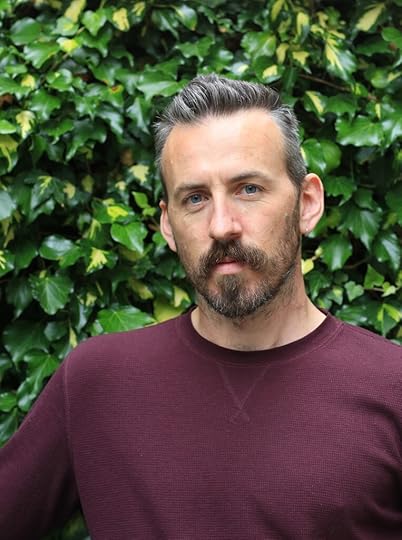 Paul Duffy
Paul DuffyPaul Duffy, author of Run with the Hare, Hunt with the Hound (2022), is one of Ireland’s leading field archaeologists and has directed numerous landmark excavations in Dublin as well as leading projects in Australia, France and the United Kingdom.
He has published and lectured widely on this work, and his books include From Carrickfergus to Carcassonne—the Epic Deeds of Hugh de Lacy during the Cathar Crusade (2018) and Ireland and the Crusades (2021). He has given many talks and interviews on national and international television and radio (RTÉ, BBC, NPR, EuroNews).
Paul has also published several works of short fiction (Irish Times, Causeway/Cathsair, Outburst, Birkbeck Writer’s Hub) and in 2015 won the Over the Edge New Writer of the Year Award. He has been shortlisted for numerous Irish and international writing prizes and was awarded a writing bursary in 2017–2018 by Words Ireland.
Social Media Links:
Website: https://www.paulduffywritings.com/
Twitter: https://twitter.com/PDufaigh
Facebook: https://www.facebook.com/PDufaigh/
March 14, 2023
Pagan Warrior by MJ Porter: The Coffee Pot Book Blog Tour
Today, I am delighted to host MJ Porter on this book blog tour. MJ has kindly provided some historical background to the setting of the book (see below).
You can follow the full tour here:
https://thecoffeepotbookclub.blogspot.com/2023/02/blog-tour-pagan-warrior-by-mj-porter.html
Pagan Warrior by MJ PorterAudiobook narrated by Matt Coles
From bestselling author, MJ Porter, comes the tale of the mighty pagan king, Penda of Mercia.
Britain. AD632.
Penda, a warrior of immense renown, has much to prove if he is to rule the Mercian kingdom of his dead father and prevent the neighbouring king of Northumbria from claiming it.
Unexpectedly allying with the British kings, Penda races to battle the alliance of the Northumbrian king, unsure if his brother stands with him or against him as they seek battle glory for themselves, and the right to rule gained through bloody conquest.
There will be a victor and a bloody loser, and a king will rise from the ashes of the great and terrible battle of Hædfeld.
Universal Buy Link: books2read.com/PaganWarrior
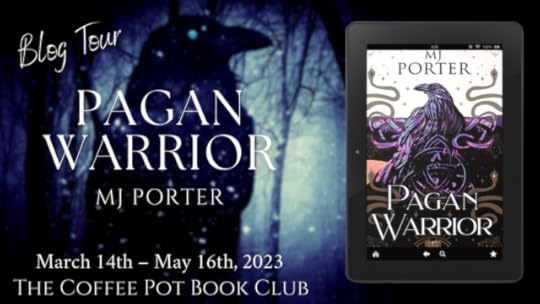 A Little Bit about the Author
A Little Bit about the Author MJ Porter is the author of many historical novels set predominantly in seventh to eleventh-century England, as well as three twentieth-century mysteries. Being raised in the shadow of a building that was believed to house the bones of long-dead Kings of Mercia, meant that the author’s writing destiny was set.
Some Historical Background to Britain in the Seventh Century – a Patchwork of Kingdoms
One of the hardest processes when writing about this very early period of Britain is to get an idea of what the kingdoms might have looked like and to explain this to the reader. The seventh century is often seen as the period when the Heptarchy, the seven very well-known kingdoms of the Saxon period, emerged and formed, ultimately derived from potentially very many much smaller kingdoms, the names of which are only rarely still known.
The Heptarchy consisted of the kingdoms of Northumbria (itself derived from the uniting of Deira and Bernicia), Mercia, the kingdom of the East Angles, Wessex, Sussex, Kent, and Essex. In later centuries, these kingdoms would merge until only four main kingdoms remained, and then, from the early middle of the tenth century, England emerged. But the battle of Hædfeld with which Pagan Warrior concludes was a British-wide battle set as this process was formalising in the seventh century, and there are yet more kingdoms that must be mentioned which didn’t form part of Saxon England.
Scotland didn’t yet exist, but Dal Riata, Pictland and Alt Clut (sometimes called Strathclyde) did. Wales didn’t exist, although the kingdoms of Gwynedd, Deheubarth, Ceredigion and Powys did, The kingdom of Dumnonia (modern-day Cornwall), was also in existence and very much not part of Saxon England. Indeed, these kingdoms are often termed British, as opposed to Saxon. As someone woeful at geography – I purposefully don’t adopt the names of places from this period because it confuses me – I’m only too well aware of how much I’m asking from my reader as it is without adding weird place names to already strange sounding personal names, and yet it was necessary to add a whole host of strange names, which often, have no relation to the current names of counties, let alone kingdoms.
All of these different kingdoms, we’re told, were involved in some way in the battle of Hædfeld. Some of the kingdoms joined the alliance, spear-headed by Cadwallon of Gwynedd, Edwin’s foster-brother. Others joined that of Edwin of Northumbria. Almost all of them took one side or another in the mighty battle of Hædfeld fought in 632 or 633 (there is some confusion about the exact date) between the two sides. To ensure my readers have some idea of who’s who, I’ve termed all of the character’s as being ‘of’ their kingdom, although I’m unsure if that’s actually how they might have been named.
I was surprised by how many individuals could be named from the seventh century, particularly for the build-up to the battle of Hædfeld. The cast is not Game of Thrones huge, but it was larger than I expected. Not just Penda of the Hwicce, only later could he be termed of Mercia, and Cadwallon of Gwynedd in the British ‘alliance’, but also Cloten of Deheubarth, Clydog of Ceredigion, Eiludd of Powys, Clemen of Dumnonia, Domnall Brecc of Dal Riata, Beli of Alt Clut and Eanfrith of Bernicia. While on the Northumbrian led alliance were Edwin of Northumbria, alongside his children, Osfrith and Eadfrith, as well as Eowa of the Hwicce, Osric of Deira – Edwin’s cousin, Cynegils of Wessex, Sigeberht of the East Angles and Oswald of Bernicia – Edwin’s nephew. At least, that’s how I stack the two sides as the battle is about to commence. In later periods, it is sometimes a struggle to find who was king of where and when that might have been, so to find so many characters, even if it can seem a little overwhelming, was fantastic and ensured that the British-wide battle of Hædfeld could be retold in Pagan Warrior with a nod to each of these kings, and the part they might, or might not, have played in the events that played out on that fateful day in October 632 or 633.
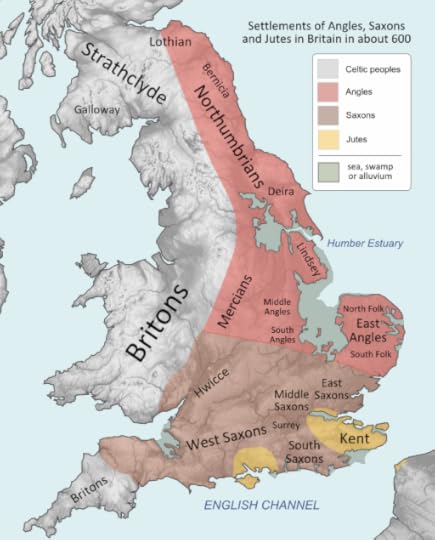
Image Credit Wikimedia Commons: Map of Britain in the 600s, User:Hel-hama, CC BY-SA 3.0
Social Media Links:Linktr.ee: https://linktr.ee/MJPorterauthor
Narrator, Matt Coles:
Instagram: https://www.instagram.com/mattcolesvoiceovers/
Tiktok: https://www.tiktok.com/@mattcolesvoiceovers
Website: www.mattcolesvoiceover.com
March 9, 2023
Historical Fiction Author of the Month: Carol Hedges
Welcome to my new Blog Series, Historical Fiction Author of the Month.
Each month, I will showcase a different historical fiction author. Their books will range from romance to mystery and adventure, and will be from many different eras. I hope you discover a new author and their work to enjoy. Happy reading!
In this post, I am delighted to feature author, Carol Hedges, whose Victorian series I love.
Carol Hedges Carol Hedges
Carol HedgesI am 72, and a UK writer of 18 books for Teenagers/Young Adults and Adults. My writing has received much critical acclaim, and my novel Jigsaw was long-listed for the Carnegie Medal.
I am probably best known, however, as the author of ‘The Victorian Detectives’ ~ a series of ten novels set in 1860s London and featuring Detective Inspector Leo Stride and his side-kick Detective Sergeant Jack Cully, who work for the detective division of Scotland Yard.
I live in Hertfordshire with a Tortie-Siamese cat called Halley, who thinks my writing chair belongs to her, a husband (we’ve been married for 48 years) and a lot of pond fish. When not writing/sleeping/trying to resist cake. I am a political activist ~ and can be seen outside the Houses of Parliament, protesting against this government and its policies. I have two grandchildren, both sadly now domiciled in New York, one of whom is the star of a series of blogs called The Adventures of L-Plate Gran, which I wrote while looking after her.
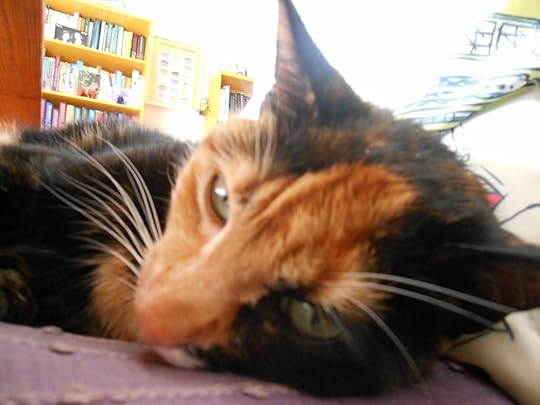
Recently I have started learning Yiddish, partly to reconnect with my family’s German Jewish past (I lost my paternal grandparents during the Holocaust) and stop my aged brain from deteriorating. Mazel tov! I’m currently blogging about this experience as The Adventures of L-Plate Bubbe.
Although I have been published by two big mainstream publishers, I am now self-published under the imprint Little G Books. My work is available via Amazon in print and ebook format.
What enticed you to write in this genre?I never intended to write a historical fiction novel, let alone a whole series. For many years, I was a children’s author, published by OUP and Usborne. I had a top London agent. I appeared at the Edinburgh and Cheltenham Literary Festivals. But fate intervened. In 2008, there was a banking crash, and as a result, publishers of children’s fiction decided to cut back on mid-list writers like me and invest in celebs, pop stars and already known writers instead. Suddenly, I found myself with no publisher interested in reading my manuscripts. But I couldn’t NOT write ~ that was like not breathing! So I decided to move genre, and wrote Diamonds & Dust ~ a one off, quirky first-person slightly Goth Victorian detective novel . My agent hated it and refused point blank to submit it. So we parted company, and, long story short, I decided the way forward for me was to take control and self publish.
Looking back, it was a logical progression. My degree was in English Literature, specialising in the Victorian period. I loved reading Dickens and his contemporaries, researching the period and immersing myself in every aspect of the era. Ten books later and a lot of lovely appreciative readers, [including me, Carol!] here I am. Grateful for the chance to share my writing and my passion with you, the reader.
Some Reviews …“As always, Carol Hedges brings Victorian London and its inhabitants to vibrant and atmospheric life with evocatively distinctive and descriptive prose. The multilayered mystery is told from various perspectives in the present tense, which puts the reader right at the scene, and there’s a varied cast of characters, ranging from despicable to engaging. Cleverly written dialogue gives insights into characters’ personalities and motivations. ” (Cathy Ryan)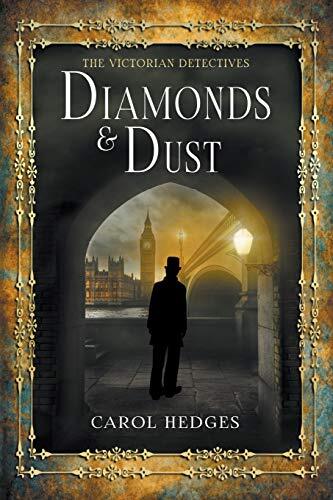
“Carol Hedges skilfully weaves these stories together, with echoes of Dickens and Conan Doyle. The writer has done her research but displays it with a light touch. She paints a vivid picture – warts and all – of Victorian London. All our senses are in play here. The characters are well drawn, entirely believable and I had no trouble distinguishing them.” (Sandra Firth)
Social Media Links:Blog: https://carolhedges.blogspot.com/
Visit my unusual Facebook Page: https://www.facebook.com/thecuriousVictorian/
On Twitter: @riotgrandma72
Explore Carol’s BooksUniversal link: Author.to/Victoriancrime
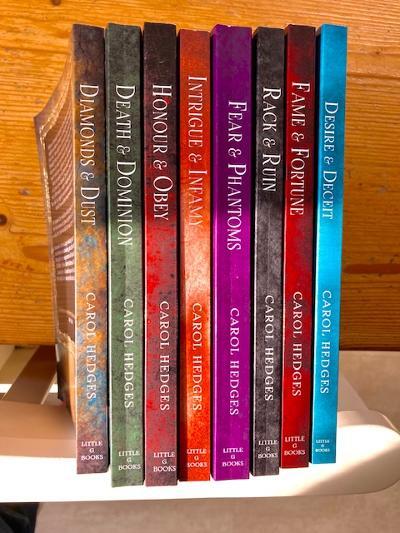 I’m delighted to share the news that next month’s author is Stella Riley
I’m delighted to share the news that next month’s author is Stella Riley
Death at Castle Cove by Mary Grand: Book Spotlight
‘Death At Castle Cove’ by Mary Grand is set on the picturesque Isle of Wight and features amateur detective Susan Flynn and her partner Alice.
Susan’s life revolves around walks in the country with her dog and meeting her fellow dog lovers for strolls along the coastal paths. Her young lodger, Colette, seems to be fitting in well, after a difficult start in life. But when Colette dies in suspicious circumstances, Susan realises that her dog walking friends were the last to see her alive. She has to face the disturbing fact that one of her friends may be responsible.
The local police put it all down to an unfortunate accident, but Susan is not convinced. As she looks in to the mystery, she finds out that her friends have much to hide – and one of them must have killed Colette.
Buy Link: Death at Castle Cove
Mary GrandMary’s writing career started with self-publishing three novels, Free to Be Tegan’, ‘Hidden Chapters’ and ‘Behind the Smile’ alongside two free anthologies of short stories ‘Catching the Light’ and ‘Making Changes’.
 Mary Grand
Mary GrandIn 2020, she was very excited to start working with the amazing Boldwood Books, who published her first murder mystery, ‘The House Party.’ This book was followed by two more island murder mysteries, ‘The Island’ and ‘Good Neighbours.’
Her latest book, published by Boldwood on March 8th 2023, is the first in a new series featuring amateur detective Susan Flynn and her partner Alice called ‘Death at Castle Cove.’ This is a murder mystery, a classic whodunnit. This series is set in the present day but is inspired by many years of reading Agatha Christie!
Social Media
Website: https://marygrand.net
Facebook: https://www.facebook.com/mary.grand
Twitter: https://twitter.com/authormaryg
March 7, 2023
Hiding in Plain Sight by Eoghan Egan
Today I am delighted to feature Hiding in Plain Sight by fellow Irish crime writer, Eoghan Egan.
A Little Bit About the Book …A vicious serial killer roams the Irish Midlands with his sights set on his next victim…
Hiding in Plain SightA Little Bit about Eoghan
A native of Co. Roscommon, Eoghan wrote his first story aged nine.
 Eoghan Egan
Eoghan EganAt college, he studied Computer Programming, works in Sales Management & Marketing, but his passion for reading and writing remains.
Eoghan’s work got shortlisted for the 2018 Bridport Short Story Prize, and Listowel’s 2019 Bryan McMahon Short Story Award Competition. His novel was a contender in literary agent David Headley’s opening chapter Pitch Competition, and during March 2019, Eoghan’s entry won Litopia’s prestigious Pop-Up Submission.
A graduate of Maynooth University’s Creative Writing Curriculum, and Curtis Brown’s Edit & Pitch Your Novel Course, Eoghan divides his time between Roscommon and Dublin.
Social Media Links
Facebook: https://www.facebook.com/eoin.egan.9085/
Instagram: https://www.instagram.com/eoghanegan/
Twitter: https://twitter.com/eoghanegan
February 23, 2023
The Black Madonna by Stella Riley: The Coffee Pot Book Club Tour
You can follow the full tour here: https://thecoffeepotbookclub.blogspot.com/2022/12/blog-tour-black-madonna-by-stella-riley.html
The Black Madonna by Stella Riley(Audiobook narrated by Alex Wyndham)
As England slides into Civil War, master-goldsmith and money-lender, Luciano Falcieri del Santi embarks on his own hidden agenda. A chance meeting one dark night results in an unlikely friendship with Member of Parliament, Richard Maxwell. Richard’s daughter, Kate – a spirited girl who vows to hold their home against both Cavalier and Roundhead – soon finds herself fighting an involuntary attraction to the clever, magnetic and diabolically beautiful Italian.
Hampered by the warring English, his quest growing daily more dangerous, Luciano begins to realise that his own life and that of everyone close to him rests on the knife-edge of success … for only success will permit him to reclaim the Black Madonna and offer his heart to the girl he loves.
From the machinations within Parliament to the last days of the King’s cause, The Black Madonna is an epic saga of passion and intrigue at a time when England was lost in a dark and bloody conflict.

Buy Links:
*Only £1.95 / $1.95 for the duration of the Blog Tour*
Universal Buy Link: https://books2read.com/u/bPNKpd
Amazon UK: https://www.amazon.co.uk/Black-Madonna-Roundheads-Cavaliers-Book-ebook/dp/B00D4CF3LM/
Amazon US: https://www.amazon.com/Black-Madonna-Roundheads-Cavaliers-Book-ebook/dp/B00D4CF3LM/
Amazon CA: https://www.amazon.ca/Black-Madonna-Roundheads-Cavaliers-Book-ebook/dp/B00D4CF3LM/
Amazon AU: https://www.amazon.com.au/Black-Madonna-Roundheads-Cavaliers-Book-ebook/dp/B00D4CF3LM/
Barnes and Noble: https://www.barnesandnoble.com/w/the-black-madonna-stella-riley/1115550936?ean=2940044562431
Kobo: https://www.kobo.com/gb/en/ebook/the-black-madonna-5
Apple: https://books.apple.com/us/book/the-black-madonna/id659127225
Smashwords: https://www.smashwords.com/books/view/321222
Audio: https://www.audible.co.uk/pd/The-Black-Madonna-Audiobook/B07SYMJ11G
 The Black Madonna – An Excerpt
The Black Madonna – An ExcerptA rescue … and the beginning of a close and unusual friendship.
Richard and Eden turned north through the labyrinthine alleyways of Bridewell in order to cross the Fleet. It was an insalubrious area and, fully alive to the possibility of robbery, Richard kept a watchful eye around them – which was how he came to notice the savage proceedings, illuminated by fitful moonlight, in a yard off to his left.
What was happening was happening in near-silence – largely due to the gag which had been stuffed into the victim’s mouth while two pairs of hands held him roughly upright to receive the blows of a third. Richard broke his son’s lethargy with one sharp jab of his elbow and then went plunging in at the assailants with a sort of flying dive that Eden, plunging swiftly in behind him, still found time to admire.
Dropped like a well-roasted chestnut while his captors met the unexpected attack, the victim slithered down the wall into an inert heap on the cobbles. His fall passed unheeded.
Finding himself bereft of his cudgel without quite knowing how, the first man launched himself at Richard and collided with a fist that broke two teeth and loosened several others. Eden, meanwhile, in a series of flawlessly executed moves learned in the Hotel de Cazenove (and a couple of effective but less genteel ones picked up in the taverns outside it), laid one man out cold against a water-butt and sent the other into staggering, retching retreat up the lane with Gap-Tooth in unsteady pursuit.
Richard flexed the fingers of his right hand, winced and grinned companionably at his son.
‘Well. It’s nice to know that your time at Angers wasn’t completely wasted.’
‘And almost as comforting to discover that you’ve still got the hardest fist in three counties,’ retorted Eden with a grin. Then, in a very different tone, ‘The only satisfaction, I suspect, either one of us will get. Have you seen who we’ve rescued?’
Richard dropped on one knee, pulled the gag from the victim’s mouth and peered into the battered, unconscious face.
‘Ah. Didn’t I see him at Far Flamstead last summer? A money-lender, isn’t he?’
‘Amongst other things,’ came the dry response. ‘Aside from pegging him up on the bridge, what do you suggest we do with him?’
Richard looked up, his brows lifting in mild surprise.
‘You don’t like him?’
‘Does anyone?’
‘I’ve no idea. But if they don’t, one presumes they have cause. Have you?’
‘Only indirectly. Not as much as whoever ordered this … but enough to understand why they might want to.’ Eden bent to disentangle one wrist from the human wreckage on the cobbles. ‘He’s not dead, at any rate.’
‘Nor even dying,’ added a thread-like voice with commendable distinctness. ‘Though I confess it feels like it.’
Slowly and with extreme caution, Luciano del Santi opened his eyes on Richard’s face and achieved the ghost of his usual sardonic smile.
‘Ah. Mr Maxwell, I believe?’
‘Yes – but never mind that now. If you’ll tell us where your house is, we’ll endeavour to get you there.’
‘Cheapside.’ The heavy lids fell again, as if in an effort to conserve energy. ‘The corner of Friday Street. It’s too far.’
‘Then where?’
‘Malt Lane … near Blackfriars Stairs,’ came the fading response. ‘The sign of the Heart and Coin.’
Eden met his father’s quizzical gaze with a carefully neutral one of his own.
‘The Heart and Coin?’ he said. ‘It sounds like a bawdy-house.’
‘The word,’ said Luciano del Santi, ‘is brothel. Don’t be shy. Just knock three times and ask for Gwynneth.’
* * *
On the mercifully short journey to Malt Lane, the Italian lapsed in and out of consciousness with a frequency that made his bearers greet the sign of the Heart and Coin with profound relief. It was a modest property but looking more like a comfortable country inn than the stew they had expected and inside, the cosy well-lit room was full of people.
The dark, beak-faced individual that Eden remembered from the hawking party was there, one hand on his knife. In front of him and involved in heated discussion were a slender, soberly-dressed woman with the whitest skin Eden had ever seen and an expression of desperate anxiety, and a small dynamic person who waved his arms wildly as he talked but still managed to look like a large brown nut with moustaches. Behind these three and collected into little tearful huddles were the girls. Girls with skin of every shade from lustrous pearl to ebony, hair of gold and copper and jet … and apparently only one thing in common. They were all uniquely beautiful.
Eden found that his mouth was open and resolutely shut it. Luciano del Santi opened his eyes, summoned his dwindling resources and said vaguely, ‘Pardon my intrusion … but if there is a chair, I believe these gentlemen would be glad to put me in it.’ And promptly passed out again.
There was a brief silence; and then the occupants of the room surged forward on a tide of exclamation. Predictably, the fellow with the knife got there first by the simple expedient of brushing the others aside. Nor did he waste time talking but merely removed his master from the hands of Richard and Eden and carried him inside to lay him carefully on the rug in front of the hearth.
The woman in grey, surrounded by the girls like a dove amongst humming-birds, followed issuing a stream of lilting orders during which Richard and Eden found themselves sitting on a cushioned settle while a dazzling blonde pressed glasses of brandy into their hands
Kneeling on the hearth and having cautiously examined the unconscious man’s ribs, Gwynneth looked up at the hawk-faced fellow and said, ‘There’s some damage but we’ll need a doctor to say how much. Certainly it’s worse than last time and I really don’t like the look of him.’
‘And that, as they say, adds insult to injury,’ breathed Luciano del Santi from behind closed lids. ‘But I forgive you. I’ll even allow Selim to put me to bed. The only question is – whose?’
A sudden flush stained the lovely skin and Gwynneth lost her calm façade.
‘You fool – you fool! Why do you do it? It’s not the first time and it won’t be the last. You promised not to stir after dark without Selim – you promised us all. One day they’ll kill you.’
The Italian opened his eyes, his mouth twisting with wry amusement.
‘No. Haven’t you realised yet that the devil looks after his own. I’m indestructible.’
‘Yes. You look it.’
He managed a long, extremely careful breath.
‘My looks again? You’re unkind, cara. Don’t cry.’
‘I’m not crying! You think I’d waste my tears on you?’ She sniffed and cradled his hand in both of hers. ‘Don’t think I care what happens to you – I don’t. But you might spare a thought for what’s to become of the girls and me if you get your throat cut.’
A faint laugh, abruptly checked, caused him to close his eyes again until the pain receded and made Gwynneth reach for the brandy.
‘Here,’ she said roughly. ‘Drink it all. And, if you must talk, say thank you to the good gentlemen who saved your worthless life tonight.’
Luciano del Santi turned his head to locate Richard and Eden, his brow furrowed with the effort of it. Then he said, ‘Forgive me. I thought you had gone.’
Richard crossed to his side, followed more slowly by Eden.
‘Think nothing of it. The brandy is excellent, so I’ve no complaints. And I’m sure that – for other reasons entirely – my son has none either.’ He paused briefly and then said, ‘Tell me … does this kind of thing happen to you often?’
‘Not often, no. Only when I grow careless.’
‘Only when you go out without Selim, you mean,’ said Gwynneth tartly. ‘There’s scarcely one of those fine gentlemen of the Court who buy their dinners with your money who wouldn’t stick a knife in your back given half a chance.’
‘You talk too much, cara.’ The beautiful voice, though faint, was pleasantly final. ‘There’s no reason why Mr Maxwell should interest himself in my affairs.’
‘None,’ said Richard, ‘save that I’ve already done so.’
‘And thereby placed me under an obligation to you.’
‘Are you suggesting that as my motive?’
The Italian stared inscrutably back at him.
‘No. I’m saying that if there is anything – either now or in the future – that I may do for you, you have but to name it.’
An arrested expression crossed Eden’s face and he opened his mouth as if to speak, then thought better of it.
Richard said, ‘I appreciate the offer and the fact that it isn’t made lightly. But not quite everything has to be paid for, signor.’
‘I know it.’ Luciano del Santi’s smile was crooked but oddly infectious. ‘But you must allow me to observe that you are the first Englishman I have met who knew it also.’
A Little Bit About Stella… Stella Riley
Stella RileyWinner of three gold medals for historical romance (Readers’ Favourite in 2019, Book Excellence Awards in 2020, Global Book Awards in 2022) and fourteen B.R.A.G. Medallions, Stella Riley lives in the beautiful medieval town of Sandwich in Kent.
She is fascinated by the English Civil Wars and has written six books set in that period. These, like the seven-book Rockliffe series (recommended in The Times newspaper!) and the Brandon Brothers trilogy, are all available in audio, narrated by Alex Wyndham.
Stella enjoys travel, reading, theatre, Baroque music and playing the harpsichord. She also has a fondness for men with long hair – hence her 17th and 18th century heroes.
Social Media Links:
Website: https://stellarileybooks.co.uk
Twitter: https://twitter.com/RileyStella
Facebook: https://www.facebook.com/stellariley.books
Instagram: https://www.instagram.com/stellarileybooks/
Pinterest: https://www.pinterest.co.uk/riley9631/stella-riley-books/
Book Bub: https://www.bookbub.com/authors/stella-riley
Amazon Author Page: https://www.amazon.co.uk/Stella-Riley/e/B0034PB7UU/
Goodreads: https://www.goodreads.com/book/show/50913323-the-black-madonna
February 21, 2023
Hammer by Micheál Cladáin: The Coffee Pot Book Club Blog Tour
Today on the blog, I am delighted to host Micheál Cladáin for his blog tour for Hammer, part of The Iron Between Series. Micheál has kindly provided an excerpt from the book, which you can read below.
You can follow the full tour here: https://thecoffeepotbookclub.blogspot.com/2022/12/blog-tour-hammer-by-micheal-cladain.html
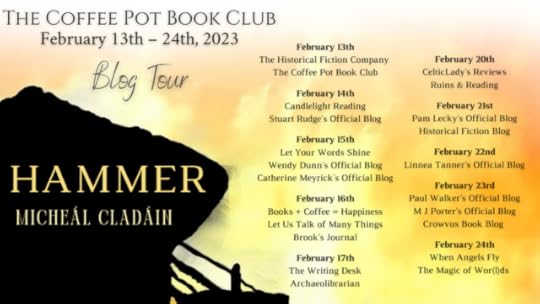 Hammer by Micheál Cladáin
Hammer by Micheál CladáinGenonn’s tired and dreams of a remote roundhouse in the Cuala Mountains.
However, sudden rebellion in Roman Britain destroys that dream because the Elder Council task him with delivering Lorg Mór, the hammer of the Gods, to the tribes across the straits of Pwll Ceris. Despite being torn between a waning sense of duty and his desire to become a hermit, Genonn finally agrees to help.
When his daughter follows him into danger, it tests his resolve. He wants to do everything he can to see her back to Druid Island and her mother. This new test of will means he is once again conflicted between duty and desire. Ultimately, his sense of duty wins; is it the right decision? Has he done the right thing by relegating his daughter’s safety below his commitment to the clans?
Buy Links:
Hammer is available to read on #KindleUnlimited.
Universal Link: https://books2read.com/u/bzKZWz
Amazon UK: https://www.amazon.co.uk/dp/B0BMLQML9J
Amazon US: https://www.amazon.com/dp/B0BMLQML9J
Amazon CA: https://www.amazon.ca/dp/B0BMLQML9J
Amazon AU: https://www.amazon.com.au/dp/B0BMLQML9J
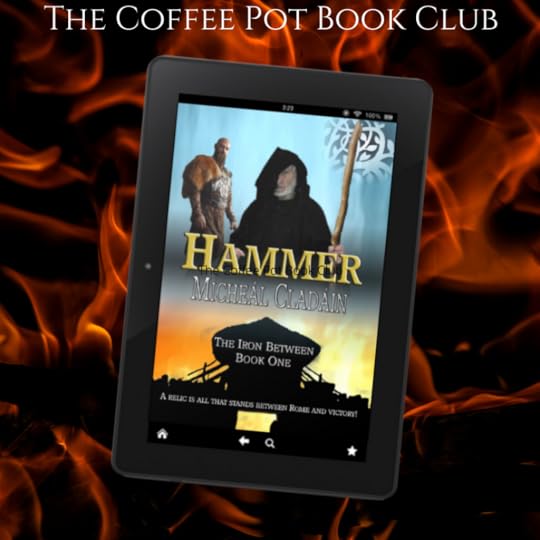 Hammer: An Excerpt
Hammer: An ExcerptIreland, Southwest of Tara – CE 60 or 61
Genonn stopped just inside and frowned at the patrons glowering at him. What had been a raucous celebration was now a dense silence. The same silence greeted his arrival in drinking halls across the land. The revellers were thinking the thought that struck every person when he walked into a hostel or feast hall: “What have we done?” they asked themselves. “Why has a druid arrived here?” Guilt was always at the forefront of their unimaginative intellects when a druid arrived without the chieftain having sued the Elder Council for aid.
Nothing but a hostel full of Cúl an tí. Country folk — always the same.
Genonn smiled at the stern faces, hoping the tension would ease when he offered a story in exchange for a sup and a bite, removing their inherent fear. Silver usually followed a story because — truth be told — he was a good storyteller. Knew all the best tales and carried the gift of the gab, or so they said. Most would buy ale and a story before a meal, which he availed of whenever the chance arose.
Studying the dim interior, Genonn decided it was a bit of a midden. There was a stink of something unpleasant from the mouldering rushes; dirty cups and plates were piled at the ends of the tables. Barrels were stacked at the back with a man standing beside them, washing pots in a tub filled with steaming water. Either he was the hosteller or was a local paying for his food. He seemed like a bit of a bundún, so the hosteller was the likely answer.
This could be the hole where I begin my final song.
Genonn’s song: the song of the warrior and An Dagda’s hammer. During the task set by the Elder Council, he discovered the warrior had stolen the hammer. Having hunted for him through the length and breadth of Ériu, Genonn hoped he might be in this dingy hole, still loose after ten Samhains with a price on his head. It was the warrior’s type of establishment, a place where he could drink himself into Tír nÓg.
It used to be. He might have changed.
With that thought, Genonn hobbled over to the barrels and resting his staff against the wall, he asked the pot washer, ‘A bite to eat and a sup of mead for a story?’
‘Why should I give you food, and my patrons give you silver? You could be any old vagabond, chancing your arm for a free meal,’ the hosteller scoffed. ‘I’m not one to hand over without credentials.’
So, once again, my foretelling comes to pass. The hosteller and, without question, a bundún.
‘You want to know my credentials, you say.’
‘Aye. You want my food and my patrons’ silver, old man,’ the hosteller said, indicating the men and women in the hall, ‘you better give me a good reason.’
‘Very well. I am Genonn, called The Vigilant by some. I am a druid, a greybeard, a seeker. Late of the Elder Council on Ynys Môn. Their leader once, many Samhains ago.’
The hosteller scoffed and continued pot washing, ignoring Genonn.
‘You do not believe me, I fear.’ Bundún.
‘You think me a fool, old man? True, you are worn around the edges, grey of beard, but wouldn’t give you more than forty summers. The Vigilant would have been born during my father’s time, before the battle of Gairech.’
‘Before your father, even, but he is Genonn, so he is,’ someone said from a bench in the deeper shadows.
Genonn squinted into the dark beside the barrels as his heart began to race. He could not see any details of the speaker except a slight reflection of the brazier light, but he did not need more light. He would know the voice anywhere. It belonged to a man he had counted as a friend, at least until he murdered two innocent boys.
A Little Bit about Micheál
Micheál has been an author for many years. He studied Classics and developed a love of Greek and Roman culture through those studies. In particular, he loved their mythologies. As well as a classical education, bedtime stories consisted of tales read from a great tome of Greek Mythology, and Micheál was destined to become a storyteller from those times.
Social Media Links:
Website: www.philhughespublishing.com
Twitter: https://twitter.com/cladain_m
Facebook: https://www.facebook.com/PerchedCrowPress
Instagram: https://www.instagram.com/mickcladain/
Amazon Author Page: https://www.amazon.com/stores/Miche%C3%A1l-Clad%C3%A1in/author/B07BGWK6BD
Goodreads: https://www.goodreads.com/author/show/17189173.Miche_l_Clad_in
February 12, 2023
Historical Fiction Author of the Month: Tony Riches
Welcome to my new Blog Series, Historical Fiction Author of the Month.
Each month, I will showcase a different historical fiction author. Their books will range from romance to mystery and adventure, and will be from many different eras. I hope you discover a new author and their work to enjoy. Happy reading!
In this post, I am delighted to feature author, Tony Riches.
Tony Riches Tony Riches
Tony RichesTony Riches is a full-time UK author of Tudor historical fiction. He lives with his wife in Pembrokeshire, West Wales and is a specialist in the lives of the Tudors. As well as his new Elizabethan series, Tony’s historical fiction novels include the best-selling Tudor trilogy and his Brandon trilogy, (about Charles Brandon and his wives). Tony also has a popular podcast series, Stories of the Tudors. For more information about Tony’s books visit his website www.tonyriches.com and his blog, The Writing Desk and find him on Facebook and Twitter @tonyriches
I’m sure readers are curious to know what enticed you to write in this genre in particular, Tony?I was born in Pembroke, birthplace of Henry Tudor, who became King Henry VII and began the Tudor Dynasty, but I only began to study its history when I returned to the area as a full-time author. I also took part in the successful campaign for a statue of Henry Tudor to be placed in front of Pembroke Castle.
I found several accounts of Henry’s life, but no novels which brought the truth of his story to life. The idea for the Tudor Trilogy occurred to me when I realised Henry Tudor could be born in book one, ‘come of age’ in book two, and rule England as king in book three, so there would be plenty of scope to explore his life and times.
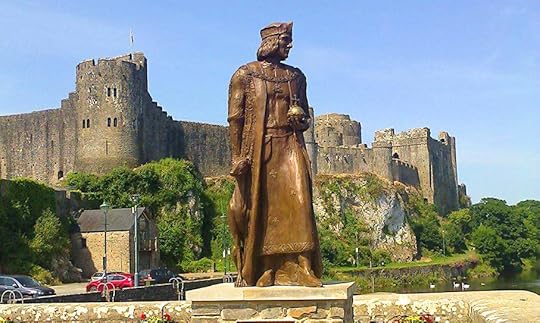
I’m pleased to say all three books of the Tudor trilogy became best-sellers in the US and UK, and I decided to write a ‘sequel’ about the life of Henry VII’s daughter, Mary Tudor, who became Queen of France. This developed into the Brandon trilogy, as I was intrigued by the life of Mary’s second husband, Charles Brandon, the best friend of Henry VIII. The final book of the Brandon trilogy, about his last wife, Katherine Willoughby, has also become an international best-seller.
Katherine saw Elizabeth I become queen, and I began writing an Elizabethan series, so that my books tell the continuous stories of the Tudors from Owen Tudor’s first meeting with Queen Catherine of Valois through to the end of Queen Elizabeth’s reign.
Explore Tony’s Books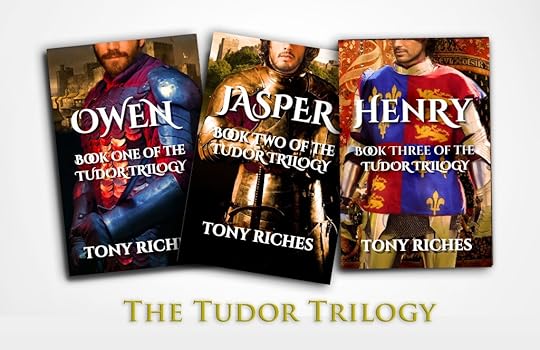
The fascinating story of the rise of the Tudor dynasty, from Welsh Servant Owen Tudor meeting the lonely widowed Queen Catherine of Valois.
Based on first hand research including following in Henry Tudors footsteps to remote Brittany, and his return to the Battle of Bosworth to become the first Tudor King of England.
https://mybook.to/TheTudorTrilogybooks
Discover the true story of Charles Brandon, best friend of King Henry VIII – and his wives Mary Tudor and Katherine Willoughby. Based on actual events of courage, passion and adventure in the turbulent world of the Tudor court.
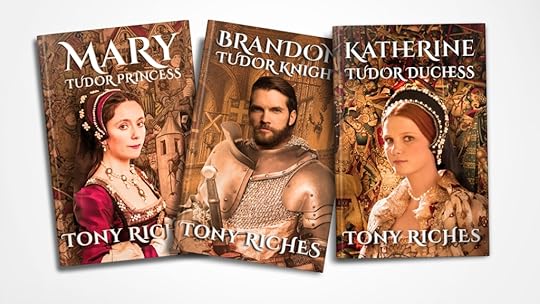
Mary Tudor watches her elder brother become King of England and wonders what the future holds for her.
https://mybook.to/TheBrandonTrilogy
Enter the court of Queen Elizabeth with the Elizabethan Series
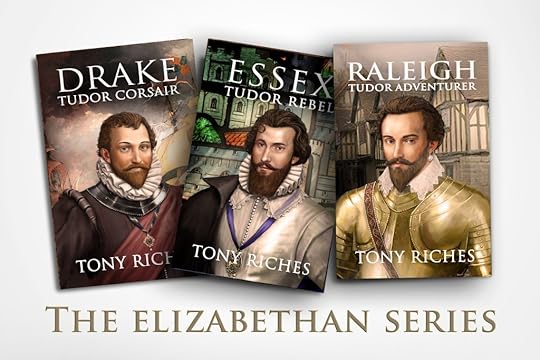
Three favourites of Queen Elizabeth I who saw different facets of her. Drake showered her with gold and jewels, Essex was the errant son she never had. Raleigh was her protector.
https://mybook.to/TheElizabethanSeries
You can find out more about Tony and his work by checking out his social media links below:
Amazon UK: https://www.amazon.co.uk/Tony-Riches/e/B006UZWOXA
Amazon US: https://www.amazon.com/Tony-Riches/e/B006UZWOXA
Website: https://www.tonyriches.com/
Writing blog: https://tonyriches.blogspot.com/
Twitter: https://twitter.com/tonyriches
Facebook: https://www.facebook.com/tonyriches.author
Instagram: https://www.instagram.com/tonyriches.author/
TikTok: https://www.tiktok.com/@tonyriches.author
Podcasts: https://tonyriches.podbean.com/
Goodreads: https://www.goodreads.com/author/show/5604088.Tony_Riches
I’m delighted to share that next month’s author is Carol HedgesFebruary 8, 2023
The Adventures of Ruby Pi and the Geometry Girls: The Coffee Pot Book Club Blog Tour
You can follow the tour here: https://thecoffeepotbookclub.blogspot.com/2022/12/blog-tour-adventures-of-ruby-pi-and-geometry-girls.html
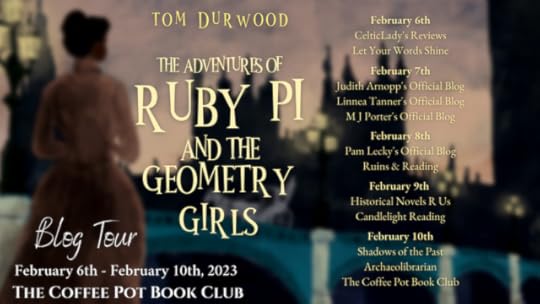 The Adventures of Ruby Pi and the Geometry Girls by Tom Durwood
The Adventures of Ruby Pi and the Geometry Girls by Tom DurwoodYoung adult fiction featuring gambling, bandits, swordplay, probability and Bayes’ Theorem. An English teacher hopes to engage students with colorful STEM adventures.
“In this outstanding collection, Tom addresses the chronic problem of our young women dropping out of STEM studies. His stories lend adventure to scientific thinking.”
(~ Tanzeela Siddique, Math Instructor)
Buy Links:
Universal Link: https://books2read.com/u/4D6QQe
Amazon UK: https://www.amazon.co.uk/gp/product/B0BFG186JR
Amazon US: https://www.amazon.com/gp/product/B0BFG186JR
Amazon CA: https://www.amazon.ca/gp/product/B0BFG186JR
Amazon AU: https://www.amazon.com.au/gp/product/B0BFG186JR
Barnes and Noble: https://www.barnesandnoble.com/w/the-adventures-of-ruby-pi-and-the-geometry-girls-tom-durwood/1142255340?ean=9781952520273
Kobo: https://www.bestsellersbookstore.com/book/9781952520273
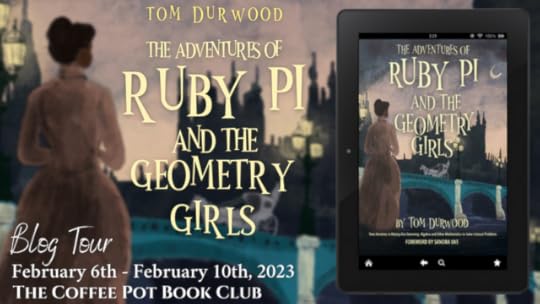 Excerpt: Girl Saves a Queen
Excerpt: Girl Saves a Queen1. ISOKE AND THE SLAYERS
In African history, we have evidence of counting and numeration systems, games and puzzles, geometry, graphs, record‐keeping, money, weights, and measures, etc.
— Paulus Gerdes, A History of Mathematics In Africa
“Come!” urged Isoke. “We can’t be late!”
The first day of the Igue festival was in full swing. With a grunt, the girl shouldered one of the ropes. “The Mundari are thoughtless merchants. They’ll let their best calves go first– ”
She pulled the big-wheeled cart through the festival grounds. Six of her brothers pulled alongside her.
“You’re a long way from home, umngeele,” called a smiling Xhosa woman standing before a tiger- patterned curtain. She used a term that meant something between “borderlander” and “boon-docker.” She waved invitingly.
“Save some time for me on the way back,” Simtho told her. She laughed. The other brothers, even grim-faced Ypiku, enjoyed this exchange.
The little outlander family, led by the skinny girl Isoke, made their way past the vendors’ stands and the livestock pens and the tapestry displays.
Isoke had visited the grounds the night before, to map out their route.
The festival grounds were a celebration of symbols and numbers – different tribes’ runes and patterns spoke of beliefs, cosmology, rituals, totem birds and animals. Seers threw sign-marked rune-stones and announced destinies. Hooded hawks perched on their masters’ arms. Teams of boys jousted, their patterned vests identifying each clan. A tethered panther paced to and fro in a large cage, its eyes resting on passers-by.
The fair seemed boundless. They could only see parts of the whole. “Stay strong, brothers!”urged the girl. “We are almost there — ”
Only fourteen years old, Isoke was the matriarch of her clan and the acting chieftain of the Atakora, a small, once- undisciplined tribe of hunters in the remote Cotinou region, on the eastern peripheries of the kingdoms of Benin. They wore their bows and shields on their backs, for all outlanders are hunters, and all hunters care to keep their weapons close by.
“Here we go – this way — ”
Isoke had been saving for over a year to buy a bull-calf, to sire the village’s heifers. A healthy herd would change the fortunes of her people, that much she knew. She was determined to do right. Her ingenious new design for the baskets was water-tight and had become much-favored among the river tribes. As word spread and others came to see, and acquire, the baskets, she had been able to collect two bags full of sarafu, the coins forged by the brass workers of Igbo Ukwu, coins which the traders of the steppes used as currency. These she would use to buy a fine bull-calf.
The Mundari bred a handsome line of cattle. “There!” called Isoke. “The Mundari pennants are just beyond — ” They rounded a corner. They had come to a sort of open space, or plaza. It was the royal court. They saw Nala, Queen of the Benin lands, the festival’s hostess, as she sat presiding over dances and livestock displays and various goings-on. Beside her stood the wiry Portuguese, her most trusted advisor. Behind Nala’s throne stood the royal guard, fine strong warriors in their war paint and feathered head-gear and imposing shields. Around the perimeters of the plaza were arranged the Queen’s closest allies, some of the most powerful tribes of the Benin nation. Isoke suddenly stopped.
Something is wrong …
“Why are we stopping?” asked Osahar angrily.
Isoke crouched and held her left hand high. She fisted the hand. Now a second time. …
Simtho, who was closest to Isoke in age and temperament, saw that his sister’s shoulders were tensed, trembling slightly.
“Something is very, very wrong,” murmured the girl.
With a signal, she bade her brothers notch their bows. They did so on the instant, not asking why. On their left, at the head of the plaza, was the royal court – On their right, among the assembled wagons, stood a broad-berthed cart. Its open bay concealed behind a tapestry of moons and stars. Without warning a blood-curdling scream tore from behind the curtain.
The tapestry was ripped away —

A clutch of roaring painted warriors appeared in its place. The assassins burst out, spears raised, ‘DEATH TO NALA!!’ on their lips —
Isoke ran straight at them —
“Wait! Wait!” cried Ypiku, the eldest of her brothers, the cautious, rule-abiding first born —
But there was no waiting.
There never is. In a real life, the most fateful events can unfold at the snap of a finger –
The ragged-toothed assassins were young and big-shouldered, fearful killers bristling with knives. One wielded a short-sword, of the European fashion. They wore leopard skins. Isoke grabbed a torch from the Xhosa and hurled it crossways, to trip the slayers as they advanced. Three of them toppled. A round of her brothers’ arrows struck down the front-line assassins before they had closed half the distance across the plaza –
A slayer hurled a spear directly at Queen Nala — Nala, a tall, fierce woman, plucked the spear from its trajectory mid-air and returned it with force.
It impaled its bearer with a ‘Thunk!’–
Now the Portagee swept a pair of pistols from his waistband, aimed and fired with loud double ‘Booms! —
Two slayers descended on Isoke, who had drawn a blade of her own — Osahar appeared. He stood in front of his sister, shielding her – Osahar kicked one slayer’s legs out from under him and garroted the second with his bow-string, until the bow snapped — The royal guard, unused to actual fighting, fled — The Queen threw herself into the shield-splintering melee.
The Portagee’s sword flashed cleverly.
Half-mad with frenzy, brave Simtho leapt on the back of a slayer, only to earn a deep wound in the shoulder for the effort — But the leopard skins had planned poorly, for now – now that their initial rush had been blunted – they were trapped.
Now a dash of hunters from the Yoruba and Xhosa and (surprisingly!) Swahili delegations ran to the aid of their Queen — For a long moment all was confusion and blood-lust. Terrible cries and shouts of Surrender! rose. The pretend-warriors who brag of their deeds but care not to wield a sword when blood is spilled huddled behind the throne.
It ended in a moment, as it had started.
And when the deadly combat had stilled, and when the dust and smoke had settled, it was the scrawny border girl, Isoke, who stood in the center of the plaza, still and tall among the fallen.
Shivering hilts and bloody spears and moaning bodies surrounded her.
In the distance, drums started up. Isoke surveyed the square. Now a war chant rose, in celebration of Queen Nala’s great victory, and the selfless bravery of her subjects. The Portagee raised his sword in salute. He shook his weapon.
“How did you know?” he called to Isoke. “What gave them away?”
She wiped her blade on the fabric of her skirt. “Geometry,” the border girl replied.
A Little Bit about TomTom Durwood is a teacher, writer and editor with an interest in history. Tom most recently taught English Composition and Empire and Literature at Valley Forge Military College, where he won the Teacher of the Year Award five times. Tom has taught Public Speaking and Basic Communications as guest lecturer for the Naval Special Warfare Development Group at the Dam’s Neck Annex of the Naval War College.
 Tom Durwood
Tom DurwoodTom’s ebook Empire and Literature matches global works of film and fiction to specific quadrants of empire, finding surprising parallels. Literature, film, art and architecture are viewed against the rise and fall of empire. In a foreword to Empire and Literature, postcolonial scholar Dipesh Chakrabarty of the University of Chicago calls it “imaginative and innovative.” Prof. Chakrabarty writes that “Durwood has given us a thought-provoking introduction to the humanities.” His subsequent book “Kid Lit: An Introduction to Literary Criticism” has been well-reviewed. “My favorite nonfiction book of the year,” writes The Literary Apothecary (Goodreads).
Early reader response to Tom’s historical fiction adventures has been promising. “A true pleasure … the richness of the layers of Tom’s novel is compelling,” writes Fatima Sharrafedine in her foreword to “The Illustrated Boatman’s Daughter.” The Midwest Book Review calls that same adventure “uniformly gripping and educational … pairing action and adventure with social issues.” Adds Prairie Review, “A deeply intriguing, ambitious historical fiction series.”
Tom briefly ran his own children’s book imprint, Calico Books (Contemporary Books, Chicago). Tom’s newspaper column “Shelter” appeared in the North County Times for seven years. Tom earned a Masters in English Literature in San Diego, where he also served as Executive Director of San Diego Habitat for Humanity.
Two of Tom’s books, “Kid Lit” and “The Illustrated Boatman’s Daughter,” were selected “Best of the New” by Julie Sara Porter’s Bookworm Book Alert
Social Media Links:
Website: www.themathgirls.com
Newsletter: empire-studies-press.mailchimpsites.com
Twitter: https://twitter.com/TDurwood
Facebook: https://www.facebook.com/thomas.durwood.52
LinkedIn: https://www.linkedin.com/in/tom-durwood-542bb422/
Pinterest: https://www.pinterest.fr/theusefulsherpa/
Amazon Author Page: https://www.amazon.com/Tom-Durwood/e/B00935QAQ6
Goodreads:https://www.goodreads.com/author/show/5462355.Tom_Durwood



